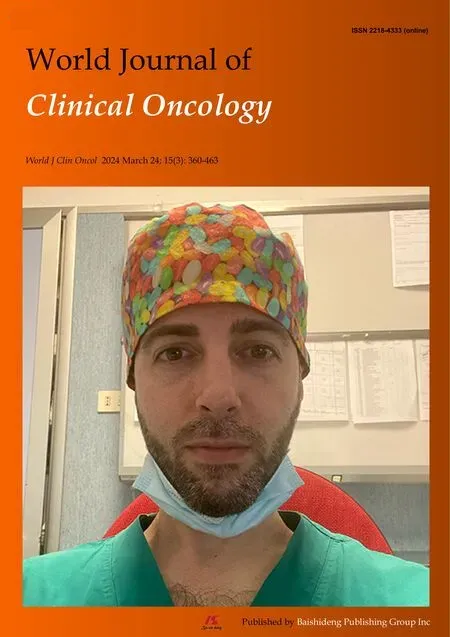Approaches and challenges in cancer immunotherapy pathways
Maria Kapritsou
Abstract Cancer immunotherapy is an effective with critical approaches in the treatment of oncological patients.Whilst numerous research and clinical trials are underway to develop endogenous immunotherapy approaches,it is necessary to focus on fundamental issues and identify barriers to basic clinical progress.Addressing these challenges and the new pathways will require researchers and clinicians to join forces to accelerate the understanding of the complex interactions between cancer and the immune system and focus resources on developing better treatments for patients.
Key Words: Immunotherapy;Oncological patients;Immune response;Target therapies;Cancer vaccinations
INTRODUCTION
Currently,among available cancer treatment methods,including traditional chemotherapy,radiation therapy,and surgery,immunotherapy is regarded as the fourth option.Over the last decade,immunotherapy has received significant attention due to its ability to enhance overall survival rates in a subset of patients considered untreatable.The recent advances made by biotechnology have led to several developments in cancer treatment and care,such as immune checkpoint inhibition (ICI),chimeric antigen receptor T cell therapy (CAR-T),and various forms of vaccination for cancer[1].
Although these methods are frequently successful,with most cases claiming defeat against specific tumor subtypes,some treatments,such as ipilimumab,a melanoma anti-CTLA4 antibody,show remarkable improvement beyond other therapies in squamous cell carcinoma of the head and neck management.Thus,although immunotherapeutics,such as anti-PD1 nivolumab,have gained aberrant FDA approval status designations,they still encounter unignorable financial challenges called impediments.Hence,facing countless issues without a complete understanding of how reversal treatment works requires experts to work even harder to design innovative,effective,evidence-based approaches.Therefore,new insights are needed.Although scientists broadly understand host-tumor interactions,they continue finding new data through well-articulated,detailed reviews and studying ICI-adoptive CAR T cell treatment and vaccines at a broad scope.Thus,they guide the prioritized simultaneous implementation of tools used in various fields,thereby providing future chances of success based on accurate,evidence-based updates[2,3].
Further research into checkpoint inhibitory pathways could aid ICI treatment and help combat tumor escape mechanisms alongside the suppressive effects of tumor microenvironment on the immune response.CAR-T yields good outcomes only in certain hematological malignancies,requiring an enhancement of its effectiveness by countering tumorassociated macrophages as an immunosuppressive component.Trials combining all these treatment modalities might be beneficial,given an improved response in terms of targeting alternative pathways through ICIs[4].
Tumor mutation burden plays an important role as a target for treatment to impair tumor immunity,inhibit tumor growth,and restore therapeutic efficacy.However,personalized differences influence drug reactions,making predictions uncertain despite notable success rates of PD-1/PDL1 or anti-CTLA4 therapy above 15%-25%,ensuring patient variability[3,4].
Biotherapy options include inducing immunologic responses that engage checkpoint inhibitors and improve targeted antibodies.Hence,adoptive cell transplants allow for controlled cancer management tactics against various malignancies without suffering radiation or chemotherapy side effects due to the accurate selection process.This development relies heavily on immuno-oncology studies fundamental to current achievements in this field,inspiring further global progress in combating cancer through biotherapy innovations,starting with novel immune-based approaches stemming from new technologies.Moreover,experimental neogenic vaccines focused primarily on pinpointing tumor mutation burden can lead to discoveries,significantly improving patient outcomes and,ultimately,accelerating research progression.Consequently,considering basic knowledge of therapeutically applied oncology,advancements in continuously updating areas aimed at better cancer control will ensure the constant development of oncology in the future[5].
Despite new approaches to boost immune cell sensitivity and activity against tumor cells,such as cancer vaccines and chemokine treatment,immunotherapy has presented major challenges.First,some oncological patients have experienced a dramatic response.Unfortunately,while scientists hope to develop an effective therapy for various patients,immunotherapy has proven successful for only a small proportion of malignancies.Furthermore,these successful cases are often the minority.Second,discovering biomarkers and cancer pathways is important for immunotherapy success.Moreover,chemotherapy and radiotherapy are performed before immunotherapy,possibly impeding the improvement in cancer immunotherapy efficacy.Therefore,cancer immunotherapy is currently not generally recommended as a first-line therapy and is typically given to patients whose immune system is already weakened due to advanced disease or previous treatment[6].
CONCLUSION
Over the last decade,cancer immunotherapy has transformed how physicians treat cancer patients.There is an impressive potential for immunotherapeutic methods in various clinical contexts—even those who previously developed resistance to treatment show promising results after such novel therapy.
FOOTNOTES
Author contributions:Kapritsou M wrote the manuscript.
Conflict-of-interest statement:All the authors report no relevant conflicts of interest for this article.
Open-Access:This article is an open-access article that was selected by an in-house editor and fully peer-reviewed by external reviewers.It is distributed in accordance with the Creative Commons Attribution NonCommercial (CC BY-NC 4.0) license,which permits others to distribute,remix,adapt,build upon this work non-commercially,and license their derivative works on different terms,provided the original work is properly cited and the use is non-commercial.See: https://creativecommons.org/Licenses/by-nc/4.0/
Country/Territory of origin:Greece
ORCID number:Maria Kapritsou 0000-0002-8187-4978.
S-Editor:Gong ZM
L-Editor:A
P-Editor:Zhao S
 World Journal of Clinical Oncology2024年3期
World Journal of Clinical Oncology2024年3期
- World Journal of Clinical Oncology的其它文章
- Role of targeting ferroptosis as a component of combination therapy in combating drug resistance in colorectal cancer
- High-dose methotrexate and zanubrutinib combination therapy for primary central nervous system lymphoma
- Mechanisms and potential applications of COPS6 in pan-cancer therapy
- Leveraging electrochemical sensors to improve efficiency of cancer detection
- PD-1 antibody in combination with chemotherapy for the treatment of SMARCA4-deficient advanced undifferentiated carcinoma of the duodenum: Two case reports
- Transarterial chemoembolization plus stent placement for hepatocellular carcinoma with main portal vein tumor thrombosis: A meta-analysis
